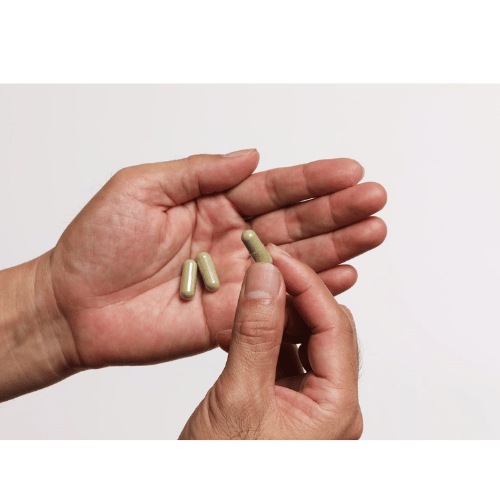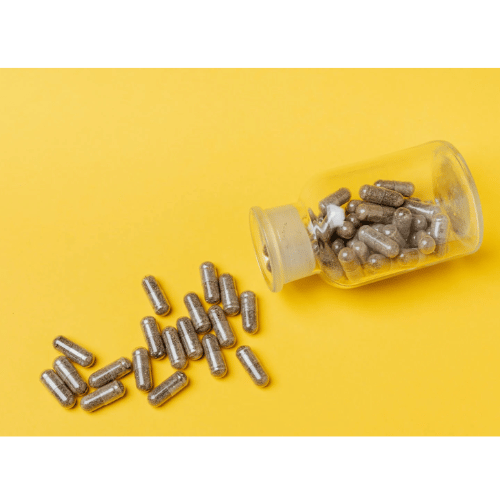Saffron, the lavish spice derived from the saffron crocus flower, has been cherished for centuries for its unique flavor, vibrant color, and potential health benefits. Known as the world’s most expensive spice, saffron has found its way into a variety of dishes, from aromatic rice to delectable desserts. But did you know that saffron is also available in supplement form? This blog post delves into the world of saffron supplements, discussing their origin, potential health benefits, side effects, and how to choose a quality product. Most importantly, we will answer the question: are saffron supplements worth it?
Key Takeaways
- Saffron supplements offer health benefits such as mood enhancement, cognitive support and weight loss.
- Potential side effects of saffron supplementation include allergic reactions and medication interactions.
- It is important to choose a quality product from a trusted brand when selecting saffron supplements.
Understanding Saffron Supplements

Saffron originates from the saffron flower, Crocus sativus, and has been used for thousands of years for its impressive health benefits and medicinal properties. As a spice, saffron threads are obtained from the flower’s stigma and styles, which are harvested through a labor-intensive method, contributing to its high price.
Recently, saffron supplementation has become increasingly popular as a more convenient method of harnessing this luxurious spice’s benefits. The primary constituent of saffron supplements is saffron extract, created by extracting active compounds from the Crocus sativus flower through processes that may involve saffron aqueous extract. One such product is the saffron extract supplement, which offers a convenient way to enjoy the benefits of this precious spice.
The supplements are available in diverse forms such as capsules, gummies, extract pills, saffron threads, and powder, each having unique advantages and disadvantages.
Saffron Extract
Saffron extract is created by extracting the active compounds from the saffron flower, Crocus sativus. These compounds include:
- Crocin
- Crocetin
- Safranal
- Kaempferol
This extract is the primary component responsible for providing the health benefits associated with saffron supplementation, such as mood enhancement, cognitive support, and weight loss.
Forms of Saffron Supplements
Various forms of saffron supplements cater to individual preferences and needs. Some common forms include:
- Capsules: These are easy to take with food or water but may not be as potent as other forms.
- Gummies: These are also easy to take and can be a more enjoyable option for some people.
- Extract pills: These offer higher potency, but their consumption may be more challenging for some people.
On the other hand, saffron threads and powder provide the most potent form of supplementation, but they can be difficult to measure and consume. Evaluating your unique needs and considering potential side effects or medication interactions is vital when choosing a saffron supplement.
Health Benefits of Saffron Supplements

Saffron supplements boast a multitude of potential health benefits, supported by scientific evidence and clinical trials. These benefits include:
- Mood enhancement
- Depression relief
- Cognitive function support
- Weight loss
We’ll further explore the specific health benefits that saffron supplementation can offer.
Mood Enhancement and Depression Relief
Saffron’s mood-enhancing and calming effects have been attributed to its ability to:
- Increase dopamine levels in the brain without affecting other brain hormones, such as serotonin
- Increase the levels of mood-elevating neurotransmitters
- Modulate the stress response
- Demonstrate anti-inflammatory effects in the brain
Studies indicate the potential of saffron supplements in mood improvement and depression symptom reduction. Additionally, saffron has shown potential in alleviating PMS symptoms like:
- irritability
- headaches
- cravings
- pain
- anxiety
A study revealed that a daily dose of 30 mg saffron proved to be better than a placebo in treating PMS symptoms. This suggests that saffron has potential as an effective remedy for PMS-related issues.
Furthermore, both saffron petals and the thread-like stigma have been found effective against mild-to-moderate depression symptoms.
Cognitive Function Support
With its neuroprotective properties, saffron can potentially enhance brain health and cognitive function. It has been suggested as a potential supplement for treating neurodegenerative disorders, such as Alzheimer’s and Parkinson’s disease, with fewer side effects than traditional medications.
Saffron has multiple benefits for the brain. It helps combat chronic stress-induced cognitive dysfunction by shielding nerve cells from free radical damage, minimizing neurodegeneration and averting the buildup of beta-amyloid protein. Such properties of saffron can help promote a healthier brain. Though early evidence suggests saffron’s potential medicinal benefits, further clinical trials are necessary to validate these claims.
Weight Loss and Appetite Control

Weight loss and appetite regulation can potentially be facilitated by saffron supplementation. Its potential to increase satiety can help reduce snacking habits and promote healthier eating patterns.
Clinical studies have assessed doses ranging from 20 to 400 mg/day of pure saffron, suggesting that taking 80 to 100 mg daily may maximize its potential health benefits, including weight loss. However, individual results may vary, and it is crucial to adhere to the instructions on the supplement label and consult a healthcare provider.
Potential Side Effects and Risks
Despite the numerous health benefits of saffron supplementation, awareness of potential side effects and risks like allergic reactions and medication interactions is crucial.
We’ll examine these risks more thoroughly.
Allergic Reactions
Individuals with allergies to certain plant species, like Lolium, Olea and Salsola, may experience an allergic reaction if they consume saffron. It is important to be aware of one’s allergies and to avoid any trigger foods. Allergic reactions may include itching, skin rash, swelling, difficulty breathing, and digestive issues.
If you believe you are experiencing signs of a severe allergic reaction, it is recommended that you seek medical attention.
Medication Interactions
Certain medications, such as blood pressure medications and sedatives, may have moderate interactions when taken with saffron supplements. It is vital to consult a healthcare professional before taking saffron supplements to avoid any potential risks or interactions with other medications.
Dosage and Guidelines for Saffron Supplementation
To maximize the potential health benefits of saffron supplements and minimize side effects, selecting the right dosage is critical.
Recommendations for the appropriate daily dosage of saffron supplements for different health benefits and guidelines for safe consumption are provided below.
Recommended Daily Intake
The suggested daily intake for saffron supplements may differ according to the purpose, but it is generally recommended to consume 15 mg of saffron extract, twice a day, for a total of 30 mg daily for chronic supplementation.
Clinical studies have assessed doses ranging from 20 to 400 mg/day of pure saffron, suggesting that taking 80 to 100 mg daily may maximize its potential health benefits.
Precautions and Contraindications
Exercise caution when taking saffron supplements, particularly if you are pregnant or have certain medical conditions. Pregnant women should not take saffron supplementation in large quantities, as it may cause the uterus to contract. This can result in a miscarriage. It is safer to stick to the amount of saffron found in common food items..
Also, be mindful of potential side effects such as anxiety, appetite changes, upset stomach, constipation, drowsiness, dry mouth, headaches, dizziness, nausea, and erectile dysfunction.
Choosing a Quality Saffron Supplement
To ensure the full benefits of this luxurious spice, it’s important to choose a high-quality saffron supplement.
Below, tips on selecting a trustworthy brand and assuring the purity of saffron supplements are provided.
Recognizing Adulterated Products
Adulterated saffron supplements may contain fillers or other plant materials, altering the product’s quality and effectiveness. To identify adulterated products, look for:
- Unusual or unpleasant smells
- Inconsistent appearance
- Rapid color change when sprinkled on water
- Weak flavor
- Lower price compared to genuine saffron
- Presence of other plant materials or fillers in the supplement
When purchasing saffron supplements, it is important to be aware of the potential for companies cutting corners.
Trusted Brands and Stores
Reliable sources for purchasing high-quality saffron supplements include:
- Nutricost
- Double Wood
- Horbäach
- Standard Dose
- Life Extension
- PHYTOCHOICE
You can also find saffron supplements at stores like Amazon, Target, and Prozone International. In fact, you might want to check out our review article on what we believe are the top five Saffron supplements on Amazon today:
Always read product reviews and compare prices to make an informed decision when selecting a quality saffron supplement.
Incorporating Saffron into Your Diet

Apart from saffron supplementation, saffron threads can also be used in cooking and various recipes for dietary incorporation of saffron. This allows you to reap the benefits of saffron in a more natural and enjoyable way.
Cooking with Saffron
Saffron threads can be used in a variety of dishes to enhance flavor and color. To extract saffron’s distinctive flavor, steep the threads in hot water (not boiling) before adding them to your dish. This method ensures that you fully capture the essence of saffron in your culinary creations.
Some popular methods of cooking with saffron include:
- Incorporating it into rice dishes like paella or risotto
- Adding it to sauces and stews for a flavorful result
- Utilizing it in desserts like saffron ice cream
- Grinding it to a powder to use as a spice in various recipes.
Saffron Recipes
A selection of delicious recipes that incorporate saffron as a key ingredient includes saffron rice, saffron risotto, saffron paella, saffron chicken, and saffron ice cream.
Experimenting with these recipes and incorporating saffron spice into your diet allows for enjoyment of its unique flavor and potential health benefits.
Golden Insights: Wrapping Up the Saffron Supplement Discussion
In conclusion, saffron supplements have truly cemented their place in the wellness world, offering a practical means to tap into the myriad of health boons this exquisite spice boasts — from mood upliftment and bolstered cognitive function to aid in weight loss. Yet, as with any supplement, a touch of caution is warranted. It's prudent to stay informed about possible side effects, any lurking risks, and potential medication overlaps. By choosing a top-notch saffron supplement and sticking to the suggested dosage, you're set to seamlessly weave saffron into your health regimen and savor its impressive advantages.
And if you're curious about the rising tide of saffron's popularity among health enthusiasts, check out our previous article that delves deep into why this golden spice is creating such a buzz!
Frequently Asked Questions
Should I take a saffron supplement?
It appears to be safe to take small doses of saffron extract in the short-term. However, potential side effects and allergy risk should be taken into account before taking saffron supplements. Therefore, it is important to speak with your healthcare provider before taking a saffron supplement.
How fast does saffron supplement work?
Saffron starts to work quickly, with effects appearing as early as 1 week. Its benefits continue to build up over the first two months, as it promotes brain health through its antioxidant, anti-inflammatory and neuroprotective properties. To experience its full effects, take 30 mg per day for a minimum of 2 weeks.
What is the best form to take saffron?
Saffron can be taken in supplement form, twice a day, or soaked in hot water as an aromatic addition to meals. Adding the threads of the plant's red stigma or its petals may also be beneficial.
Can saffron supplements help with weight loss?
Saffron supplementation may be beneficial for weight loss and appetite regulation by increasing satiety and reducing snacking habits. It has been shown to reduce hunger and cravings, as well as reduce the amount of food consumed during meals. In addition, saffron supplementation has been linked to improved mood and cognitive performance
Are there any side effects associated with saffron supplementation?
Saffron supplementation may be associated with some side effects, such as anxiety, appetite changes, upset stomach, constipation, drowsiness, dry mouth, headaches, dizziness, and nausea. However, these side effects are usually mild and temporary, and can be managed with proper dosage and monitoring.
Thanks for taking this journey with us to explore this often asked question: are Saffron supplements are worth it? And, don't forget to check out our review articles on this wonderful spice as well!
And please, come back soon to check out our next review of another awesome supplement – we’re always looking out for YOU!
*We are not qualified medical advisors. The content here is only based on our personal opinions and should NOT be used as a substitute for a healthcare professional's advice!











Member discussion